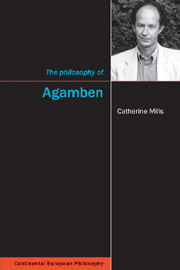Book contents
- Frontmatter
- Contents
- Acknowledgements
- Abbreviations
- Introduction
- 1 Metaphysics: negativity, potentiality and death
- 2 Aesthetics: language, representation and the object
- 3 Politics: biopolitics, sovereignty and nihilism
- 4 Ethics: testimony, responsibility and the witness
- 5 Messianism: time, happiness and completed humanity
- Conclusion
- Notes
- Chronology of major works
- Bibliography
- Index
4 - Ethics: testimony, responsibility and the witness
- Frontmatter
- Contents
- Acknowledgements
- Abbreviations
- Introduction
- 1 Metaphysics: negativity, potentiality and death
- 2 Aesthetics: language, representation and the object
- 3 Politics: biopolitics, sovereignty and nihilism
- 4 Ethics: testimony, responsibility and the witness
- 5 Messianism: time, happiness and completed humanity
- Conclusion
- Notes
- Chronology of major works
- Bibliography
- Index
Summary
The wish of all, in the camps, the last wish: know what has happened, do not forget, and at the same time never will you know.
(Blanchot, The Writing of the Disaster, 82)As we saw in Chapter 3, Agamben appropriates Walter Benjamin's apothegm that the exception has become the rule as a means of responding to the Schmittian conception of sovereignty and law as founded on the exception. Solidifying this thesis through empirical reference, Agamben subsequently argues that the paradigmatic manifestation of exceptional biopolitics is the concentration camp. Given this critique of the camps and the status of the law that is revealed in them, it is no surprise that Agamben takes the most extreme manifestation of the condition of the camps as a starting point for an elaboration of an ethics without reference to the law, a term that is taken to encompass normative discourse in its entirety. In Remnants of Auschwitz, published as the third volume of the Homo Sacer series, Agamben develops an account of an ethics of testimony as an ethos of bearing witness to that for which one cannot bear witness. Taking up the problem of scepticism in relation to the Nazi concentration camps of World War II – also discussed by Jean-François Lyotard and others – Agamben casts Remnants as an attempt to listen to a lacuna in survivor testimony, in which the factual condition of the camps cannot be made to coincide with what is said about them.
- Type
- Chapter
- Information
- The Philosophy of Agamben , pp. 81 - 106Publisher: Acumen PublishingPrint publication year: 2008

